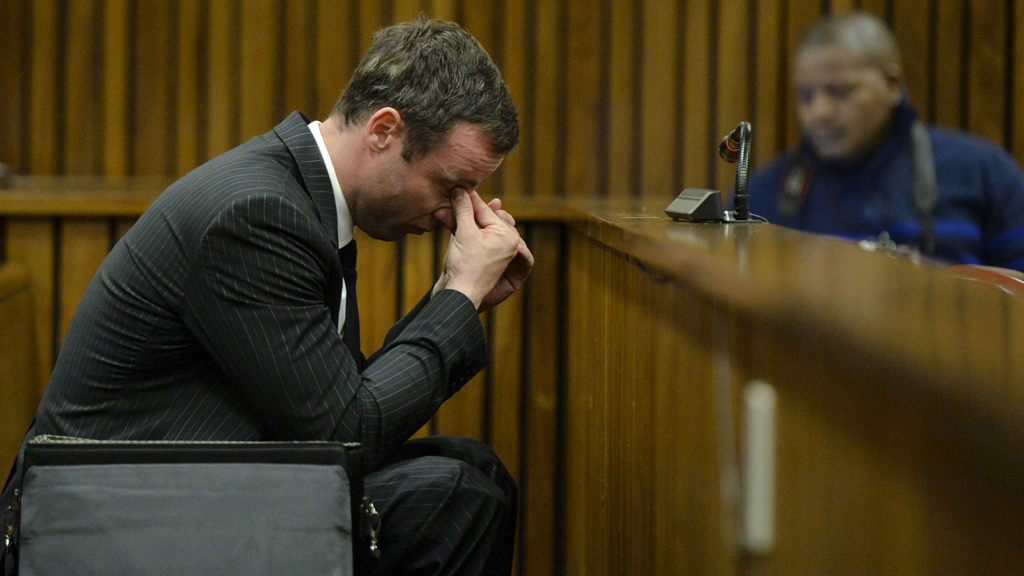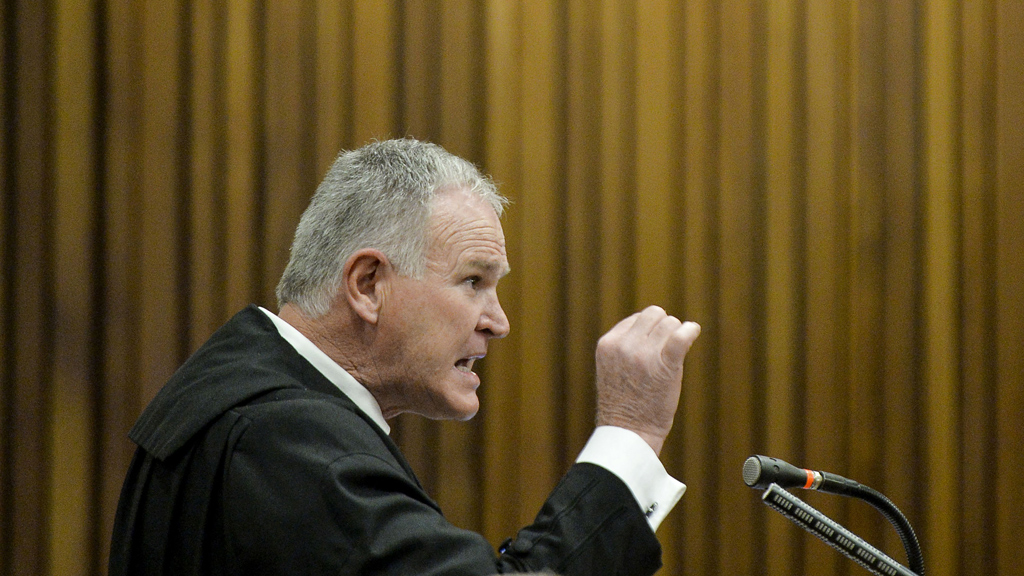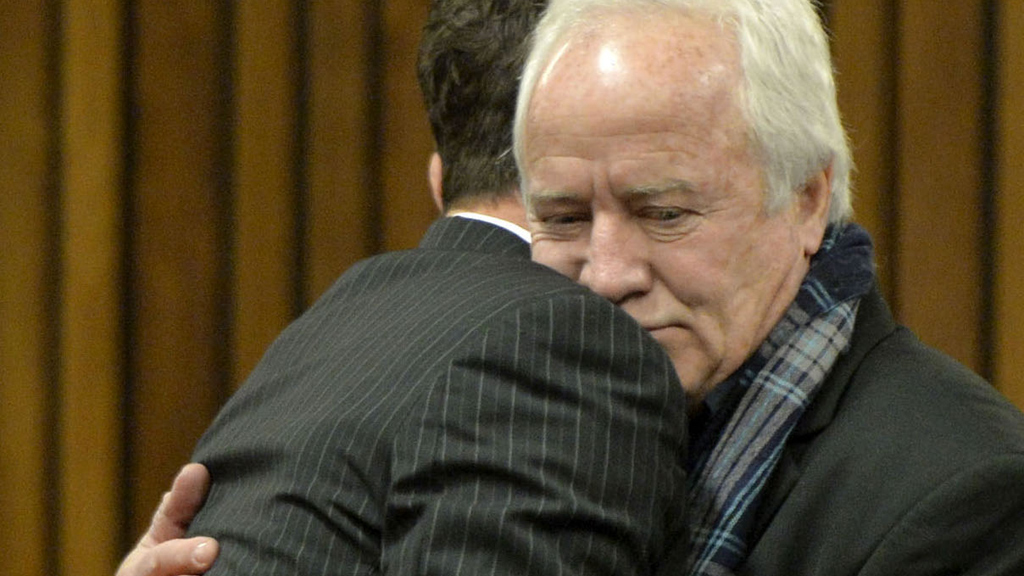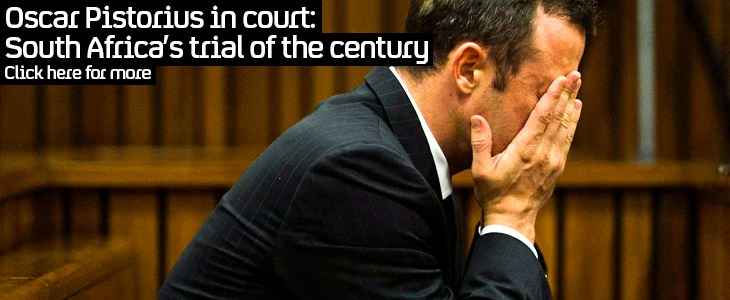‘Primal instincts’ led Pistorius to open fire says lawyer
During closing arguments, the murder trial of Oscar Pistorius hears his defence lawyer explain that the “exaggerated responses” of the highly trained athlete caused him to fire instinctively.

Double amputee Pistorius, once a national icon for reaching the pinnacle of sport, is accused of murdering his law graduate and model girlfriend Reeva Steenkamp at his home in Pretoria on Valentine’s Day last year.
If found guilty of premeditated murder, he could face life in prison. A potential lesser charge of culpable homicide could carry a sentence of 15 years.
State of mind
The defence said that Pistorius’ “primal instincts” kicked in when he shot dead Steenkamp because he was in a vulnerable and fearful state, attributing it to his disability. He told the court that there was psychological evidence that Pistorius had a heightened response to danger.
#OscarTrial Roux says psychiatrists diagnosed him with depression which means his memory was compromised (explaining his behaviour on stand)
— Debora Patta (@Debora_Patta) August 8, 2014

Explaining to the court, Roux said: “You’ve a slow burn over many a year. You’re fearful. You’re trained as an athlete and he stands with his finger ready to fire”. Banging his hand on his bench, he added that Pistorius felt exposed because he was standing on the stumps of his legs.
Witnesses
The lead attorney also cast doubt on the testimonies of neighbours, telling the judge Thokozile Masipa that there were “contradictions” in Dr Johan Stipp’s account, adding that “his evidence is impossible”.
Earlier in the trial, Dr Stipp said he heard three gunshots, followed by a woman screaming, then two or three more gunshots – something that Roux said contradicted the forensic evidence.
He accused neighbours Johnson and his wife, Michelle Burger of having discrepancies in their testimonies, saying that the screams they had heard were of Pistorius’ and not that of Steenkamp.
Oscar Pistorius murder trial: most dramatic moments so far
Ms Burger had described hearing a woman’s “blood curdling” screams followed by four gunshots on the second day of the trial. Roux questioned the “absolute” certainty shown by some of the neighbours’ regarding the number of gunshots remembered.
Stomach contents
The defence advocate focussed on pathologist Gert Saayman’s testimony about Steenkamp’s last meal as “not an exact science”.
An autopsy report found that Steenkamp still had food in her stomach after she was killed by Pistorius, leading prosecutors to challenge his story that the couple last ate around eight hours before he shot her through a toilet door.
Oscar Pistorius murder trial: the unanswered questions
However Professor Saayman concluded that the model had a meal at 1am, around two hours before she was killed – a claim that contradicts the accused’s version of events – that they were both in bed from 10pm the previous evening. Mr Roux said that gastric emptying is “not a hard and fast rule”.
Character
Pistorius’ personality exhibits no anger or hostility, Roux told judge Masipa reading from a psychiatric evaluation report. Roux said that there were no characteristics of an abusive relationship, attempting to reverse the character destruction by the prosecution the day before.
On Thursday, Chief Prosecutor Gerrie Nel presented his final arguments, saying that the athlete shot Steenkamp through the closed toilet door after an argument, describing him as an “appalling witness” who lied constantly during testimony to try to cover up the murder.
#OscarTrial Roux says OP’s sobs were not crocodile tears but those of a man in mourning – he was suffering
— Debora Patta (@Debora_Patta) August 8, 2014
#OscarTrial Roux: This man (Pistorius) suffers from a severe depression – makes sense then that his memory is not good
— Debora Patta (@Debora_Patta) August 8, 2014
However, describing his behaviour, the defence said the accused displayed “loving” personality traits, adding that he was “crying, he was wretched […] he was concerned about [Steenkamp’s] family, his emotions were all concerned about the family”.
The fathers of both Pistorius and Steenkamp were in court for the first time this week.

September verdict
In the absence of a jury, judge Masipa and her two assistants will have to weigh up the credibility of testimony on both sides.
The state prosecutor called for Pistorius’ evidence to be rejected from the judge’s consideration because it was “devoid of any truth” and the Olympic track star contradicted himself when he said during cross-examination that he fired both accidentally and deliberately. He also rebutted the defence’s arguments over when Steenkamp had eaten.
Oscar Pistorius trial: five key questions for the judge
For the defence, Roux said that the trial should only have ever been on the charge of culpable homicide, rather than murder, because he argued that he had shot Steenkamp by mistake. He concluded that Pistorius was “fixated on his anxiety”, and believed that an intruder was in the bathroom, where Steenkamp had been shot.
The verdict is expected on 11 September.
